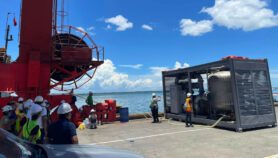Send to a friend
The details you provide on this page will not be used to send unsolicited email, and will not be sold to a 3rd party. See privacy policy.
The launch of a discussion website about the Rio+20 agenda raises questions about effective management for a successful outcome.
A few weeks ago, the Government of Brazil, in collaboration with the United Nations Development Programme, launched an interactive website intended to support discussion in the lead up to the UN Conference on Sustainable Development (Rio+20), which takes place next month.
The convenors of the platform see it as an important step towards building relevance and accountability into the way that Rio+20 is conducted, and the policy recommendations that will emerge.
But two issues challenge the impact that this website is likely to have on the policy dialogue around the meeting.
The first concerns timing. Most delegates had to register to attend the meeting before the website was set up. And the "zero draft" of the outcome — the document on which the proceedings of the meeting are likely to be focused — has already been in circulation for a couple of months.
This article is part of our coverage of preparations for Rio+20 — the UN Conference on Sustainable Development — which takes place on 20-22 June 2012. For other articles, go to Science at Rio+20
Noble as the effort to promote greater dialogue is, it is hard not to feel that it is too little, too late.
This raises the second issue, the integration of the discussions into the Rio+20 proceedings. More than 2,000 individuals have already registered on the website, reflecting a potentially stimulating amount of diversity.
But it is not clear whether discussions on the website will feature in the deliberations of the 60,000 delegates and other participants who are expected to be in Rio.
As is often the case with these types of initiatives, the technical content could be undermined by a lack of clarity around how such content will be applied.
The Value of Politics
Members of the official delegations of the G8 countries, whose economic power gives them special access at such events, are already finding it difficult to come up with an actionable agenda on behalf of their governments, even weeks before the conference opens (apart from expressing the idea that they need to be frugal.)
Certainly, it can be good to have a relatively open position when entering such negotiations. But when a country such as France sends a delegation of 350 to a conference without a game-plan for consolidating and positioning, the technical representativeness of the team appears to have become more important than managing for a successful outcome.
Indeed, implementation mechanisms have been slow to evolve around the Rio agenda. Twenty years after the first Earth Summit in Rio, there is still a need for uniform baselines that would allow countries to set targets, plans, budgets and monitoring frameworks for achieving sustainable development.
This may sound very technical, but it requires a carefully facilitated and profoundly political process.
Past experience
The UN Climate Change Conference in Copenhagen in December 2009 provided a useful illustration of this. At the end of the conference, much of the media declared the event a failure because it did not deliver binding commitments around carbon reduction and investment in green economies.
The reality was more complex. The conference was the first time that countries declared their capabilities for carbon reduction so clearly. This was an important step which led to several agreements in the 12 months following the conference.
In the case of sustainable development, the political process is no less important. This is firstly, because one’s understanding of the problem depends on how one experiences it. In addition, much rests on national or institutional perspective when one is trying to co-ordinate substantial resource investment or structural reform.
For instance, engaging the World Trade Organisation in discussions around the policy reforms needed to support sustainability of the scale to be discussed at Rio is not something that will be achieved with a single briefing document, no matter how technically sound and forward looking it may be.
Running out of time
This is not to suggest that the Rio+20 project is misguided or has ignored the challenges. But the relative successes and failures during the preparatory process are instructive.
There have been almost a dozen ‘official’ preparatory meetings in the last two years. However, one high-profile focused process stands out.
The UN High Level Panel on Global Sustainability was designed to represent every major political constituency in the world, and took 18 months to deliver its report.
The document the panel produced was more feel-good than revolutionary. But it is an important step in the process. South African president Jacob Zuma, one of the two heads of the panel, declared recently that Rio needs to urgently tackle the issue of implementation, suggesting that awareness has been raised in some crucial areas.
A few years ago, Canada’s International Development Research Centre commissioned a study to determine the value of large conferences. This suggested that such events should best be seen as a marketplace of meetings and networks, where different agendas are pursued through different means by different sub-groups. Through this process, what is a fringe meeting one year could be key-note address the next.
The problem with conferences such as Rio+20 is that we are running out of time. This means that we need to be ever more focused in our process management. Dialogue is good, but it needs to be more integrated — and timely.
Nick Ishmael Perkins
Director, SciDev.Net
This article is part of our coverage on Science at Rio+20.













